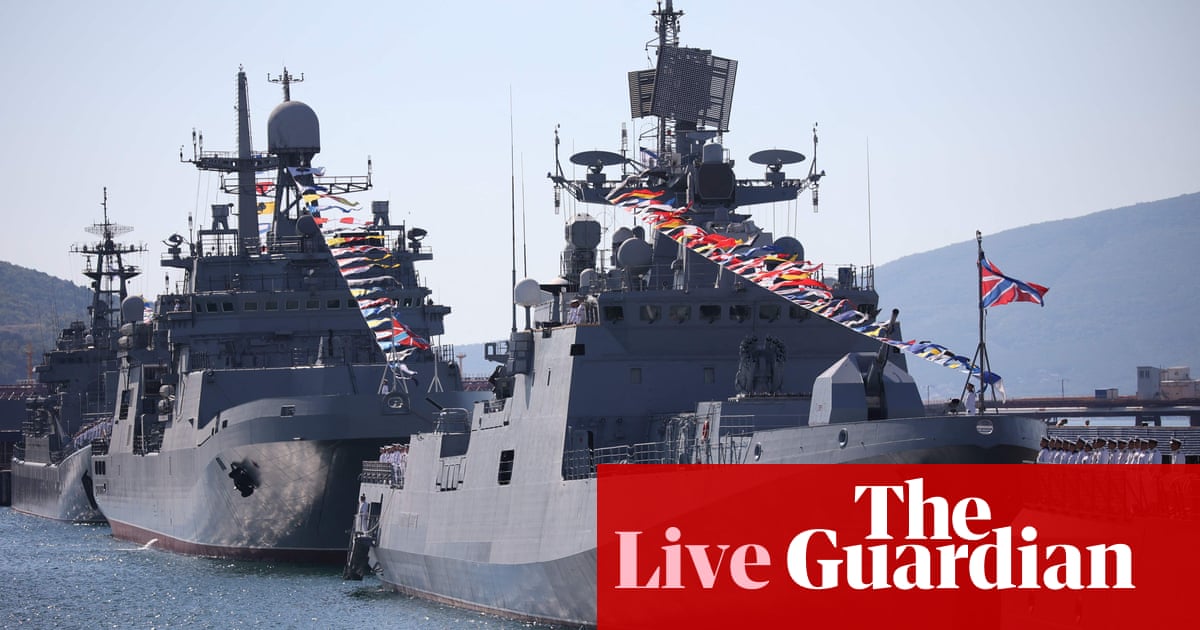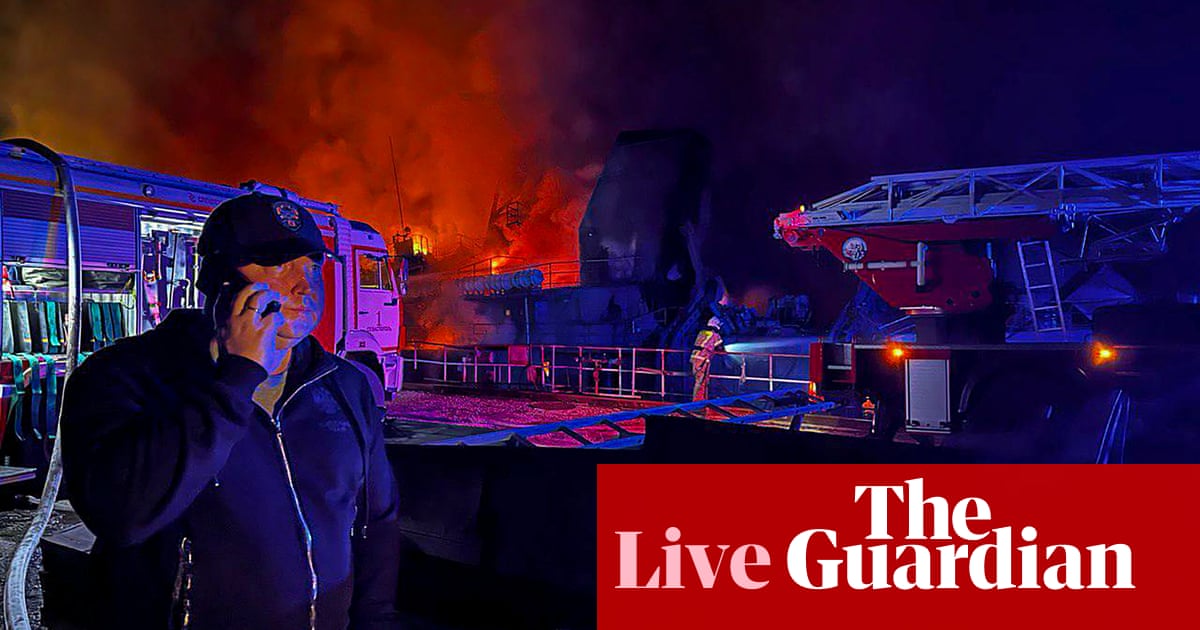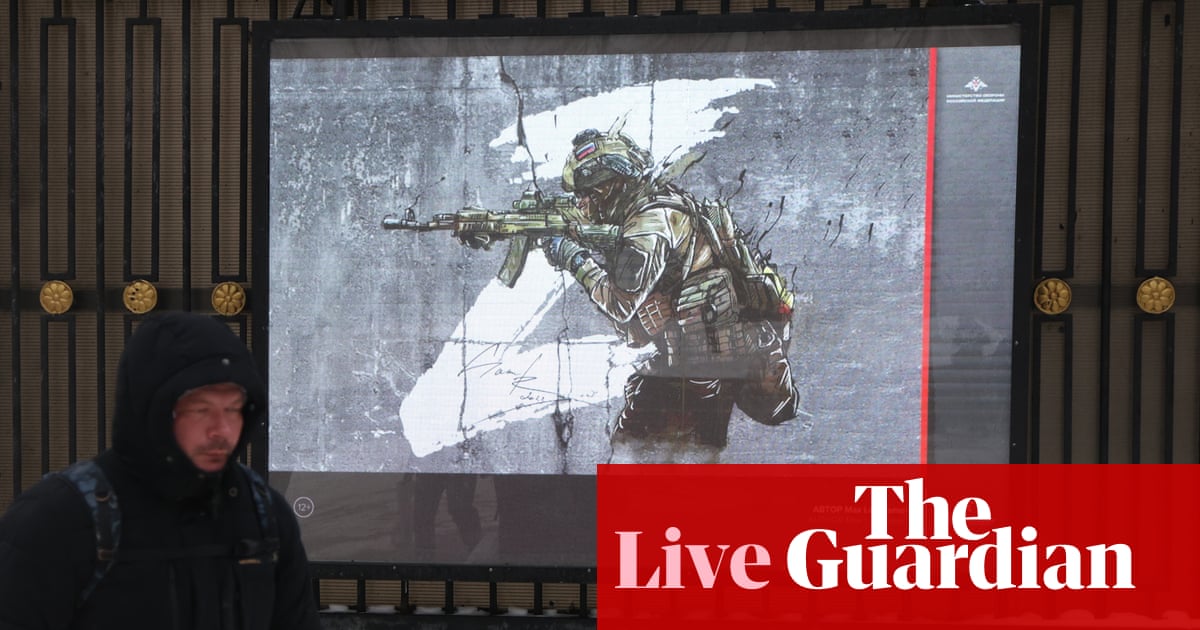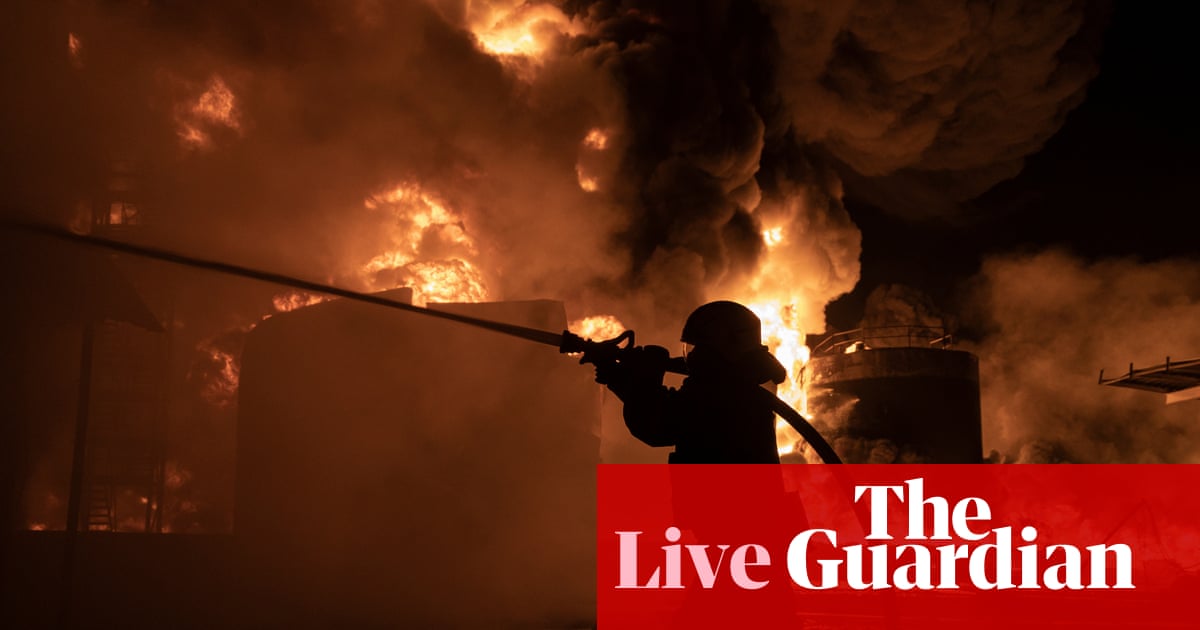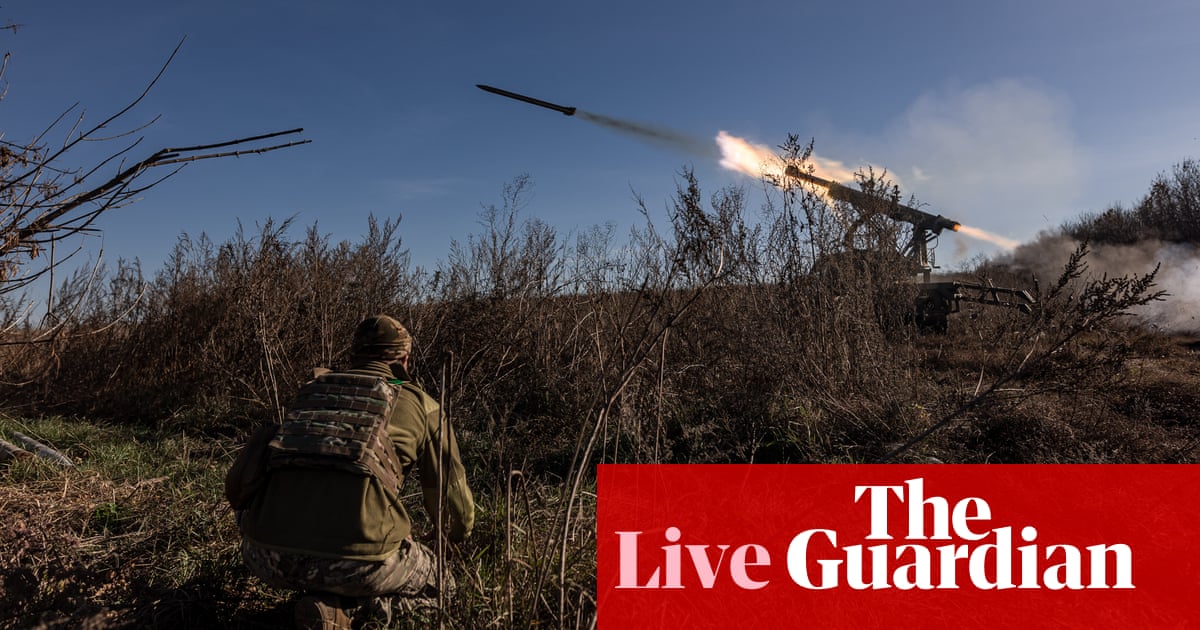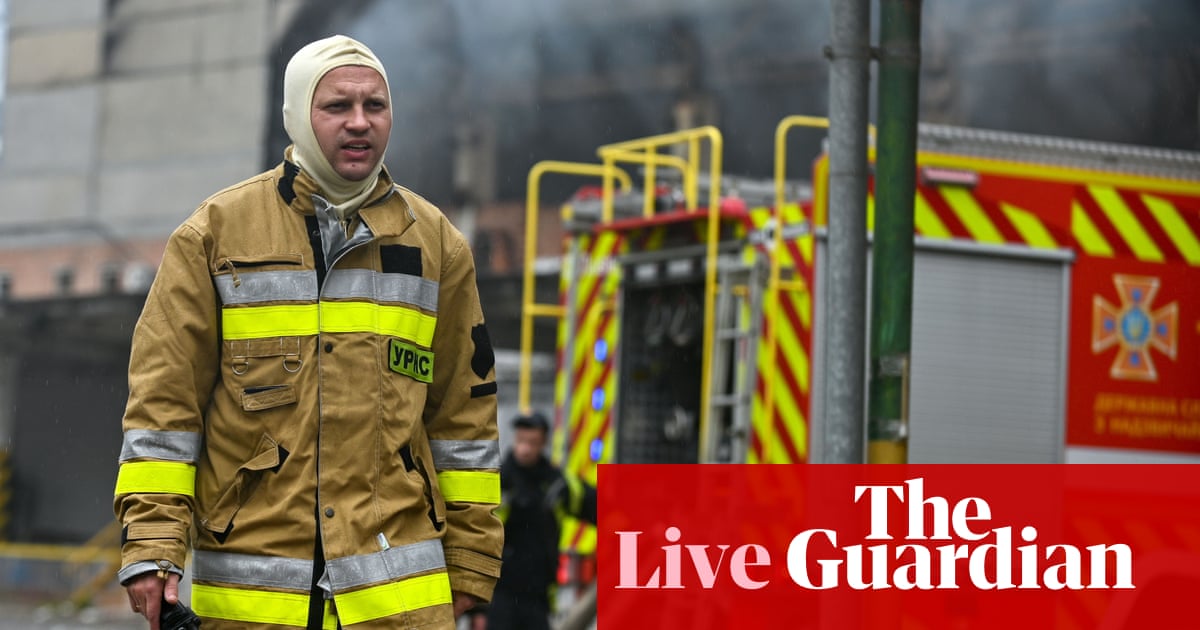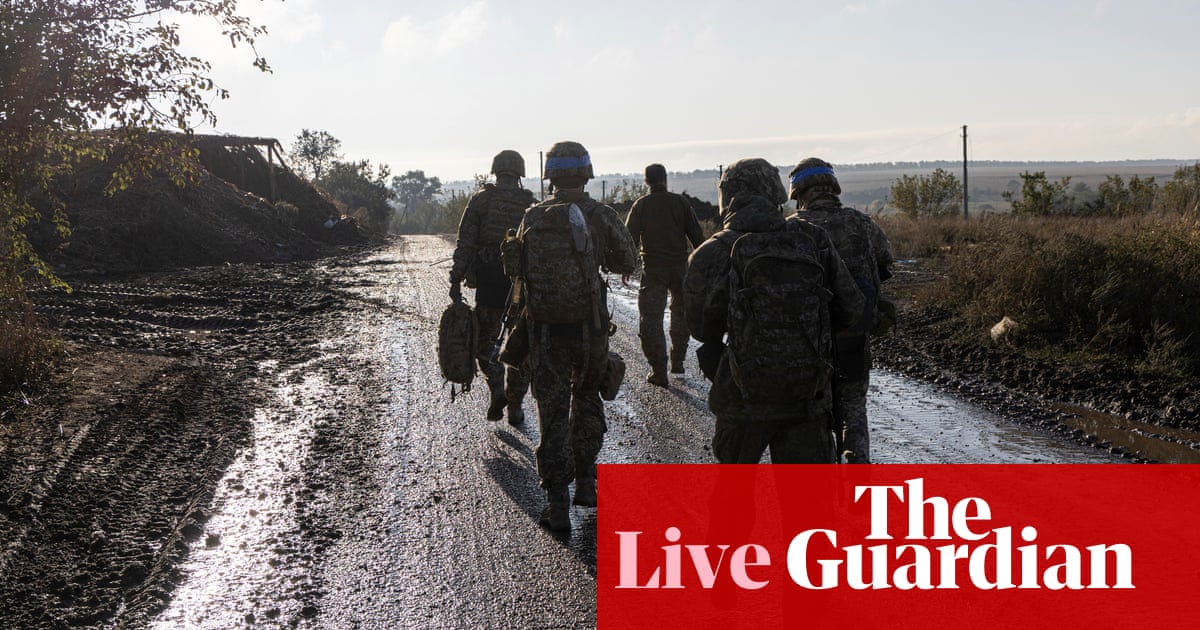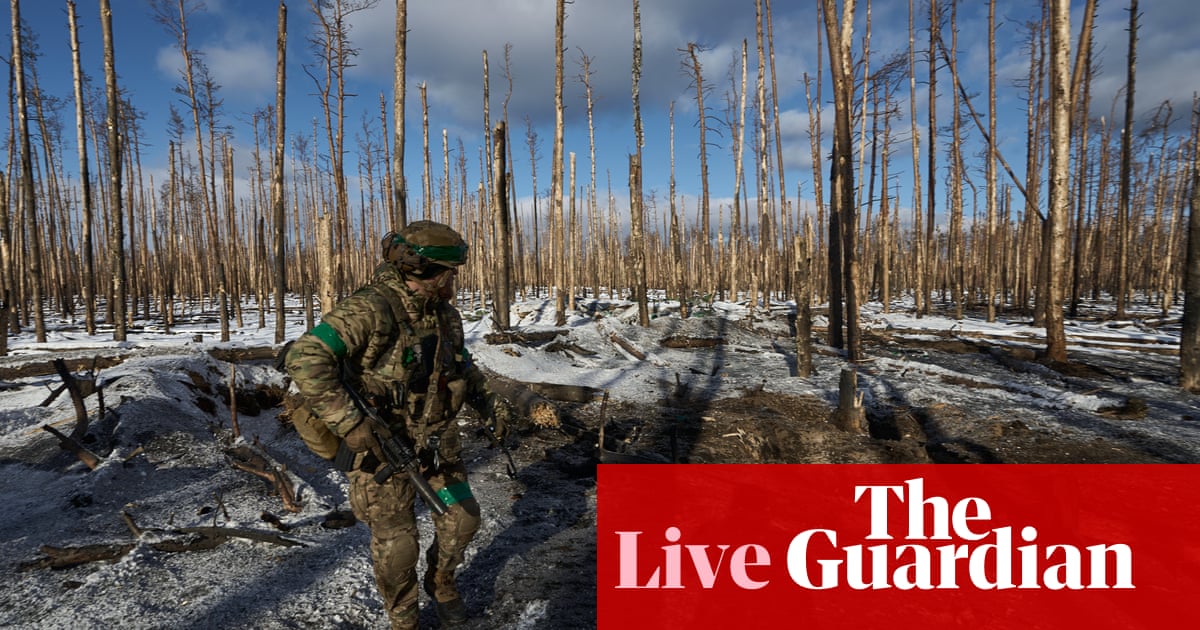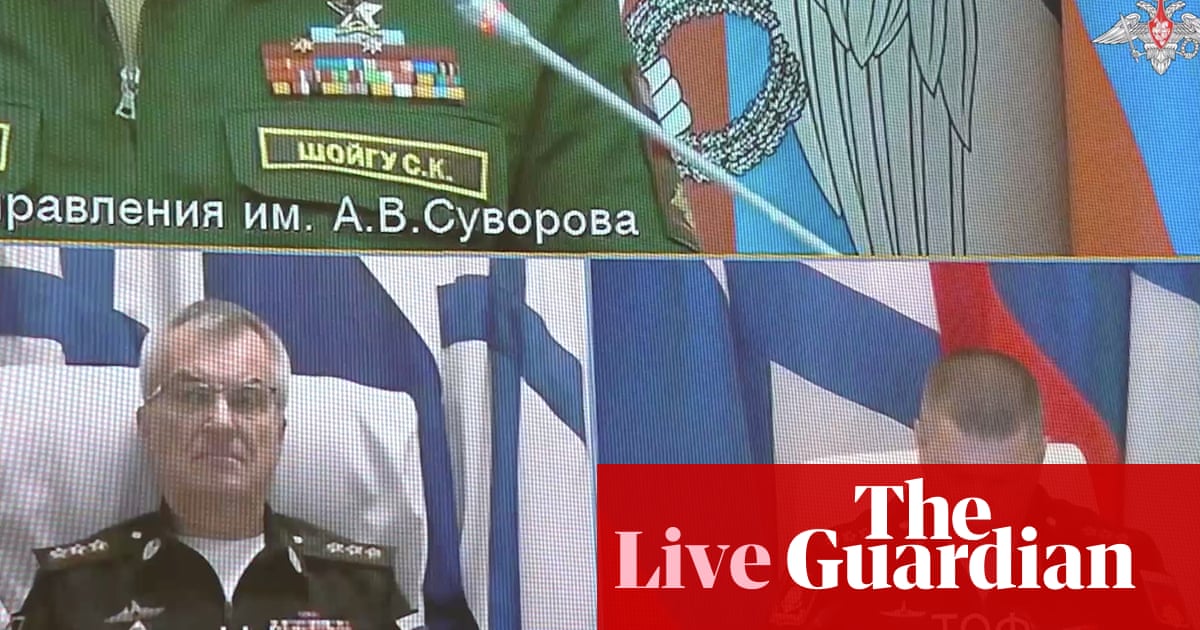
Russian Black Sea commander appears in video after Ukraine said it killed him
Russia’s defence ministry on Tuesday released footage showing Viktor Sokolov, the commander of the Black Sea fleet, attending a defence board meeting via video call, a day after Ukraine claimed that Sokolov was killed in an attack on the headquarters of Russia’s Black Sea fleet in Sevastopol.
In a video published by the defence ministry, Sokolov was shown apparently taking part in a video conference with the defence minister, Sergei Shoigu, and other top admirals and army chiefs.
Ukraine’s special forces said on Monday they had killed Sokolov, Moscow’s top admiral in Crimea, along with 33 other officers in a missile attack last week that was timed to coincide with a meeting of naval officials.
The Kremlin on Tuesday said it did not “receive any information” about Sokolov’s alleged death from the defence ministry.
Summary
Here’s a roundup of the key developments here:
Russia’s defence ministry on Tuesday released footage showing Viktor Sokolov, the commander of the Black Sea fleet, attending a defence board meeting via video call, a day after Ukraine claimed that Sokolov was killed in an attack on the headquarters of Russia’s Black Sea fleet in Sevastopol.
Suspilne, Ukraine’s state broadcaster, has reported that Ukraine’s special forces are “currently clarifying information regarding the possible death” of Adm Viktor Sokolov. The Kremlin on Tuesday said it did not “receive any information” about Sokolov’s alleged death from the defence ministry.
Canadian prime minister Justin Trudeau’s government urged the speaker of the House of Commons to resign on Tuesday for inviting a man who fought for a Nazi military unit during the second world war to attend a speech by the Ukrainian president. Just after Volodymyr Zelenskiy delivered an address in the Commons on Friday, Canadian lawmakers gave 98-year-old Yaroslav Hunka a standing ovation when the speaker, Anthony Rota, drew attention to him.
Turkey’s parliament will keep its promise to ratify Sweden’s Nato bid if US president Joe Biden’s administration paves the way for F-16 jet sales to Ankara, President Recep Tayyip Erdoğan said on Tuesday, according to Turkish media.
An overnight Russian air strike on the key Ukrainian grain exporting port of Izmail injured two people and damaged infrastructure, the governor of the Odesa region said on Tuesday. A port building, storage facilities and more than 30 trucks and cars were damaged in the attack, which lasted more than two hours, Oleh Kiper said.
The Ukrainian military reported shooting down 26 of the 38 Iranian-made attack drones it said were launched by Russia. Separately on Tuesday, a Russian missile strike also damaged a local enterprise in the southern Ukrainian city of Kryvyi Rih, its mayor, Oleksandr Vilkul, said. There were no immediate reports of casualties.
Natalia Humeniuk, spokesperson for Ukraine’s military in the south, has said that the Orlivka-Isaccea border crossing point between Ukraine and Romania is closed due to the overnight Russian drone attack. She told Radio Svoboda that drones did not cross into Romania.
Ukrainian MP Kira Rudik has called for an urgent upgrade in the air defence around Odesa, after repeated Russian attacks.
Regional authorities have stated that two people were injured in a Russian attack on Kherson earlier this morning. Ukraine’s emergency services in Kherson have reported that in the last 24 hours they have had to deal with 22 separate fires that have broken out after Russian shelling.
Tass reports that seven settlements in the Kursk region have lost power after a Ukrainian drone dropped explosives on to an electricity substation.
A cargo vessel left a Ukrainian Black Sea port on Tuesday after loading, an industry source has told Reuters, without giving any further details. Kyiv has tried to establish a temporary “humanitarian corridor” hugging the coastline, and two bulk carriers left the port of Chornomorsk last week using it. In July the UN and Turkey-brokered deal that allowed Ukraine to export grain collapsed after Russia withdrew.
We are closing this liveblog now. Thanks so much for joining us today.
The Everton Football Club owner, Farhad Moshiri, received more than £400m from Alisher Usmanov companies in the run-up to the Russian billionaire being placed under sanctions, documents suggest, raising fresh questions about the financial ties between the two men.
Records seen by the Guardian appear to show that Moshiri borrowed £145m from a company wholly owned by the Russian-Uzbek tycoon from about 2020.
The papers also set out how, between 2018 and 2022, Moshiri sold about £270m of shares in a company whose largest shareholder was Usmanov. Moshiri did not pay for those shares, public accounts imply, which accounting experts suggested could mean the share sales were a gift.
Usmanov is one of the world’s richest people and is said to be close to Vladimir Putin. He has long had business ties with Moshiri and the pair jointly owned a stake in Arsenal Football Club. Moshiri sold his Arsenal shares back to Usmanov in 2016 in order to fund his initial investment in Everton.
The discovery of the previously unreported financial records raises fresh questions about the relationship between the men – as well as the true wealth of Moshiri, just days after the British businessman disclosed a provisional deal to sell Everton to the US investment firm 777 Partners.
The papers also appear to misalign with Moshiri’s previous statements about how he could continue to fund the Premier League club himself, as well as his promise to provide ongoing financial backing that was crucial in Everton’s auditors signing off its 2022 accounts this year.
Canadian prime minister Justin Trudeau‘s government urged the speaker of the House of Commons to resign on Tuesday for inviting a man who fought for a Nazi military unit during the second world war to attend a speech by the Ukrainian president.
Just after Volodymyr Zelenskiy delivered an address in the Commons on Friday, Canadian lawmakers gave 98-year-old Yaroslav Hunka a standing ovation when the speaker, Anthony Rota, drew attention to him. Rota introduced Hunka as a war hero who fought for the First Ukrainian Division.
Rota is meeting with the Commons’ party leaders later on Tuesday. Two opposition parties called for Rota to step down on Monday, and the government house leader, Karina Gould, said she believed lawmakers had lost confidence in Rota.
Gould said Rota had invited and recognised Hunka without informing the government or the delegation from Ukraine.
Gould said:
It is time for him to do the honorable thing.
Foreign minister Melanie Joly also urged him to resign.
She said:
It is completely unacceptable. It was an embarrassment to the house and Canadians, and I think the speaker should listen to members and step down.
Joly said she spoke to the government in Ukraine about it.
Asked if he’ll continue in the job, Rota said:
We’ll have to see about that and I’m sure you’ll hear more about that later today.
The First Ukrainian Division was also known as the Waffen-SS Galicia Division, or the SS 14th Waffen Division, a voluntary unit that was under the command of the Nazis.
Trudeau said to reporters before he entered a cabinet meeting:
It’s a good thing that Speaker Rota apologised personally and I am sure that he is reflecting now on the dignity of the house going forward.
Canada’s health minister, Mark Holland, called it “incredibly embarrassing”.
The Friends of Simon Wiesenthal Center for Holocaust Studies also called for Rota to step down.
It said in a statement:
While we acknowledge his apology, Speaker Rota’s decision to invite a former member of the Waffen-SS, notorious for its involvement in Holocaust atrocities, to Canada’s parliament has left a stain on our country’s venerable legislature with profound implications both in Canada and globally.
This incident has compromised all 338 members of parliament and has also handed a propaganda victory to Russia, distracting from what was a momentously significant display of unity between Canada and Ukraine. It has also caused great pain to Canada’s Jewish community, Holocaust survivors, veterans and other victims of the Nazi regime.
Here’s the full story on Viktor Sokolov, the Black Sea commander who Ukraine claimed to have killed but who turned up in footage released by Russia, from my colleague Pjotr Sauer:
Russia’s defence ministry has released footage showing Viktor Sokolov, the commander of its Black Sea fleet, attending a defence board meeting via video call, a day after Ukraine claimed Sokolov was killed in an attack on the fleet’s headquarters in Sevastopol.
In the video, Sokolov was seen apparently taking part in a video conference with the defence minister, Sergei Shoigu, and senior admirals and army chiefs.
Ukraine’s special forces said on Monday they had killed Sokolov, Moscow’s top admiral in Crimea, along with 33 other officers in a missile attack last week that was timed to coincide with a meeting of naval officials.
The Kremlin said on Tuesday it had not “receive[d] any information” about Sokolov’s alleged death from the defence ministry.
The defence ministry released a statement that did not name Sokolov and that said the meeting had taken place earlier in the day. In an eight-minute video distributed later by the ministry, Sokolov appears on screen several times without speaking.
As Ukraine’s counteroffensive grinds on, the cost of war mounts.
The country now has more than 19,000 amputees, in eighteen months of war there have been ten times the number of amputees than Americans maimed over twenty years in Iraq and Afghanistan combined.
Ukraine is now the most mined country in the world.
Here are some images from Getty Images of one of the amputees who has been working with a rehabilitation centre after he lost his lower leg when the truck he was driving hit a land mine during fighting in Lyman in May.
The incident happened just four days after he was married.
Russia’s former leader Dmitry Medvedev said on Tuesday he visited troops near the frontline in Ukraine’s eastern Donetsk region, on orders from president Vladimir Putin, Agence France-Presse (AFP) news agency reports.
Several high-ranking Russian officials have visited occupied regions of Ukraine since Moscow’s offensive began last year, including Putin, who paid an unannounced visit to the south-eastern Ukrainian port of Mariupol in March.
Medvedev, who formerly served as president and prime minister, said:
On the instructions of the president, I visited a firing range near the contact line on the territory of the Donetsk People’s Republic.
The servicemen are demonstrating excellent combat qualities of will, firmness and a general attitude to victory.
Medvedev, who now serves as the deputy chair of the Kremlin’s security council, made the remarks in a video posted on social media.
He added that “over 325,000 people” had been recruited into the Russian armed forces since the start of the year – up from 280,000 he stated at the start of the month.
AFP was not able to independently verify these numbers.
Medvedev has been one of Moscow’s most hawkish voices in support of the Ukraine offensive and often denounces the west in inflammatory posts on social media.
Russia claimed to annex Ukraine’s regions of Donetsk, Luhansk, Kherson and Zaporizhzhia in September 2022, but does not fully control any of them.
Suspilne, Ukraine’s state broadcaster, has reported that Ukraine’s special forces are “currently clarifying information regarding the possible death” of Adm Viktor Sokolov.
Russia’s defence ministry earlier released footage apparently showing the commander of the Black Sea fleet attending a defence board meeting via video call. Yesterday, Ukraine claimed to have killed him. [See 12.53 BST]
Sokolov doesn’t speak in the video. The defence ministry claimed the meeting took place on Tuesday.
Reuters has a quick snap saying that Canada’s foreign minister, Mélanie Joly, has said that the speaker of Canada’s House of Commons should resign over the incident where Canada’s parliament gave a standing ovation to someone who fought for the Nazis against the Allies during the second world war.
Yaroslav Hunka fought in Ukraine against the Soviet Union with a Nazi military unit accused of war crimes. Speaker Anthony Rota described him as a “war hero”, and he was applauded by Canadian prime minister Justin Trudeau and Ukraine’s president Volodymyr Zelenskiy.
Canada and the Soviet Union were allies during the war, fighting against the unit Hunka was active in. The Kremlin on Monday called the incident “outrageous”, and pictures of Zelenskiy raising his fist in acknowledgment of Hunka have been widely distributed by pro-Kremlin social media accounts.
Here are some of the latest images from Kyiv to be sent to us over the newswires.
The Kremlin has refused to comment on footage showing the teenage son of the Chechen leader, Ramzan Kadyrov, beating up a prisoner.
Kadyrov posted a graphic video on the Telegram messaging app on Monday that showed his 15-year-old son Adam punching and kicking a Russian prisoner accused of burning the Qur’an.
Kadyrov accompanied the clip with a message saying he was “without exaggeration, proud of Adam’s action”.
Speaking to journalists on Tuesday, Vladimir Putin’s spokesperson, Dmitry Peskov, said: “I will say from the start, I will not comment on the story about Kadyrov’s son … I don’t want to.”
Read more of Pjotr Sauer’s report here: Kremlin refuses to comment on footage of Chechen leader’s son beating prisoner
Suspilne reports that explosions have been heard in Kherson within the last hour. It writes on Telegram “There are hits in different areas of the city.”
The former chairman of Ukraine’s giant Naftogaz Andriy Kobolyev has been given permission by the court to remove an ankle tag that he has been forced to wear for nine months after charges were laid against him that he took an unlawful bonus of $10m.
The huge bonus was paid to him after he took the Russian gas giant Gazprom to international arbitration, winning the Ukrainian gas firm a massive windfall of $5bn in 2018.
The removal of the ankle tag – which he says will make it easier for him to have a sauna – suggests the courts are losing faith in the pace of the prosecution .The move came after he submitted further affidavits from members of the Naftogaz supervisory board asserting that they had sanctioned the bonus on receiving independent legal advice.
In a case that has caused controversy in Ukraine and the US concerning politically motivated corruption prosecutions, the national anti-corruption bureau had alleged that the bonus was more than ten times the level that was legally payable to a state official at the time.
But Clare Spottiswoode, the chairwoman of the Naftogas Supervisory board at the time and previous the head of the UK gas regulator Ofgem had along with another member of the supervisory board insisted they were aware of the legislation, but believed the law – a cabinet resolution dated May 1999 limiting bonus sizes – was not applicable to Naftogaz supervisory board. She acted on legal advice provided independently by a firm called Kinstellar, and says the size of the bonus - $10m - was determined by the remuneration committee and then supervisory board, but not by Kobolyev.
She added she has at no point been directly contacted by the Ukrainian prosecutors to ask her opinion of why she had acted as she had, even though her views would be self-evidently critical to the value of a prosecution. Her testimony to the anti-corruption court is matched by another member of the board Bruno Lescoeur. He said the decision to go to arbitration was the personal decision of Kobolyev.
The charges against Kobolyev allege that he concealed from the supervisory board the existence of the regulation limiting state officials’ compensation. However, both Lescoeur and Spottiswoode assert that they were aware of the regulation limiting compensation for government officials. Moreover, they sought legal counsel before approving the bonuses awarded to Kobolyev and others.
Lescoeur’s deposition says":
An independent lawyer from Kinsteller law firm attended all supervisory board and committees meetings to advise them on the legality of their decisions.
She said in evidence to the Ukrainian court the only contact she had received was an unannounced visit by two members of the National Crime Agency on April 28 this year when she was on holiday.
The NCA left her a note asking if she was willing to engage with them on the issue and she replied on May 17 she would be delighted to do so and answered some questions posed.
In her witness statement she said she had received no further communication since then from the NCA.
His case started to be investigated in 2018. The removal of the tag does not denote his innocence, but suggests the court is becoming frustrated at the slow pace with which the prosecution is moving.
Kobolyev served as the head of Naftogaz from March 2014 to April 2021.
Here’s more detail on the drone attack on the Odesa region overnight from the Associated Press.
Russia struck the Black Sea region of Odesa in a drone barrage that damaged a warehouse, charred dozens of trucks and injured two drivers in fiery explosions that led to the suspension of the ferry service between Romania and Ukraine, officials said on Tuesday.
Video shot from the Romanian side of the Danube River showed rapid bursts of Ukrainian anti-aircraft fire streaking through the night sky followed by two orange fireballs exploding near the port area. Photos showed burned-out frames of trucks.
Romanian Border Police said ferries were anchored on the Romanian shores of the Danube in Isaccea due to the attacks on Ukraine. Traffic was being redirected through Galati, a Romanian town upstream on the Danube.
Ukraine’s air force said it downed 26 of 38 drones launched by Russia overnight.
Russian forces targeted the area of Izmail in the Odesa region, in what has become a sustained campaign to target Ukraine’s ability to export grain. Attacks on Monday killed two people in a grain warehouse in Odesa and badly damaged an abandoned high-rise hotel, officials said.
Russian artillery damaged homes, a school, a market and a food processing plant in the southern city of Kherson that is near the front lines of the war, officials said.
In fighting in the Zaporizhzhia region in the southeast, the Russian army dropped five aerial bombs on Robotyne, a town Ukraine took in August in its slow-moving counteroffensive.
New aerial video footage of Klishchiivka, on the outskirts of Bakhmut, shot with a drone for the Associated Press shows how the battle has turned the village in eastern Ukraine into a pile of rubble after months of fierce fighting.
The footage shot two days ago shows the village in ruins with destroyed Russian tanks and military vehicles littering the main road. Barely a building remains intact in the village that was once home to almost 400 people.
A rare structure that still had four walls standing was missing its roof. Single walls stood like tombstones to mark where someone once lived.
Russian Black Sea commander appears in video after Ukraine said it killed him
Russia’s defence ministry on Tuesday released footage showing Viktor Sokolov, the commander of the Black Sea fleet, attending a defence board meeting via video call, a day after Ukraine claimed that Sokolov was killed in an attack on the headquarters of Russia’s Black Sea fleet in Sevastopol.
In a video published by the defence ministry, Sokolov was shown apparently taking part in a video conference with the defence minister, Sergei Shoigu, and other top admirals and army chiefs.
Ukraine’s special forces said on Monday they had killed Sokolov, Moscow’s top admiral in Crimea, along with 33 other officers in a missile attack last week that was timed to coincide with a meeting of naval officials.
The Kremlin on Tuesday said it did not “receive any information” about Sokolov’s alleged death from the defence ministry.
Five Bulgarians living in the UK who were charged with spying for Russia appeared in court for a brief hearing, Associated Press reports.
The three men and two women were accused of “conspiring to collect information intended to be directly or indirectly useful to an enemy”, namely Russia, between August 2020 and February this year.
The five are alleged to be part of a network conducting surveillance on behalf of Russia. Much of the activity took place abroad but coordination took place in the UK, prosecutors said.
The five – Orlin Roussev, Bizer Dzhambazov, Katrin Ivanova, Ivan Stoyanov and Vanya Gaberova – appeared Tuesday by video at Westminster magistrates court in London, speaking only to confirm basic details.
The suspects were arrested by the Metropolitan police’s counter-terrorism officers in February under the Official Secrets Act.
The Kremlin said US Abrams tanks supplied to Ukraine would not change the outcome of its offensive and would “burn”, after Kyiv received shipments of the vehicles, AFP reports.
Kyiv announced this week it had received deliveries of the US Abrams battle tank, boosting its forces as they seek to break through heavily-fortified Russian defensive lines.
The Kremlin spokesperson, Dmitry Peskov, told reporters in a briefing:
All this can in no way affect the essence of the special military operation, its outcome.
There is no panacea, no single weapon that can change the balance of power on the battlefield.
Repeating a talking point the Kremlin has used about western weapons, he said:
They too will burn.
Ukraine has been asking for more Western weapons, including longer-range missiles, to help break through Russian positions and launch strikes deep within Russian-controlled territory.
Washington had promised to provide 31 Abrams tanks to Kyiv at the start of the year, part of more than $43bn (£34.5bn) in security assistance pledged by the US since the conflict began.
Russia has denounced the successive shipments to Ukraine, arguing they were prolonging the conflict.
Turkey’s parliament will keep its promise to ratify Sweden’s Nato bid if US president Joe Biden’s administration paves the way for F-16 jet sales to Ankara, President Recep Tayyip Erdoğan said on Tuesday, according to Turkish media.
Speaking to reporters on his flight back from Azerbaijan’s exclave of Nakhchivan, Erdoğan said that the foreign minister, Hakan Fidan, and US secretary of state, Antony Blinken, discussed Sweden’s Nato membership bid last week in New York.
The US administration was linking F-16 fighter jet sales to Turkey with Ankara’s ratification of Sweden’s bid, Erdoğan claimed.
Yesterday, Hungary’s prime minister, Viktor Orbán, said the Hungarian parliament was in no rush to ratify Sweden’s attempt to join Nato, which had been left in limbo since it applied to join last year.




